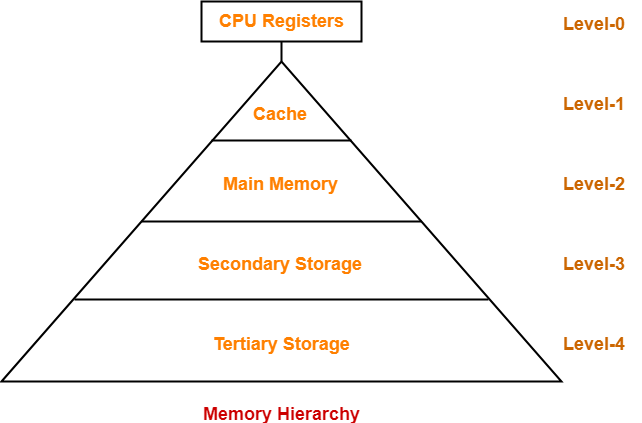Memory Hierarchy-
- Memory hierarchy is the hierarchy of memory and storage devices found in a computer system.
- It ranges from the slowest but high capacity auxiliary memory to the fastest but low capacity cache memory.
Need-
There is a trade-off among the three key characteristics of memory namely-
- Cost
- Capacity
- Access time
Memory hierarchy is employed to balance this trade-off.
Memory Hierarchy Diagram-

Level-0:
- At level-0, registers are present which are contained inside the CPU.
- Since they are present inside the CPU, they have least access time.
- They are most expensive and therefore smallest in size (in KB).
- Registers are implemented using Flip-Flops.
Level-1:
- At level-1, Cache Memory is present.
- It stores the segments of program that are frequently accessed by the processor.
- It is expensive and therefore smaller in size (in MB).
- Cache memory is implemented using static RAM.
Level-2:
- At level-2, main memory is present.
- It can communicate directly with the CPU and with auxiliary memory devices through an I/O processor.
- It is less expensive than cache memory and therefore larger in size (in few GB).
- Main memory is implemented using dynamic RAM.
Level-3:
- At level-3, secondary storage devices like Magnetic Disk are present.
- They are used as back up storage.
- They are cheaper than main memory and therefore much larger in size (in few TB).
Level-4:
- At level-4, tertiary storage devices like magnetic tape are present.
- They are used to store removable files.
- They are cheapest and largest in size (1-20 TB).
Observations-
The following observations can be made when going down in the memory hierarchy-
- Cost / bit decreases
- Frequency of access decreases
- Capacity increases
- Access time increases
Goals of Memory Hierarchy-
The goals of memory hierarchy are-
- To obtain the highest possible average access speed
- To minimize the total cost of the entire memory system
To gain better understanding about Memory Hierarchy-
Next Article- Memory Organization | Simultaneous Vs Hierarchical
Get more notes and other study material of Computer Organization and Architecture.
Watch video lectures by visiting our YouTube channel LearnVidFun.